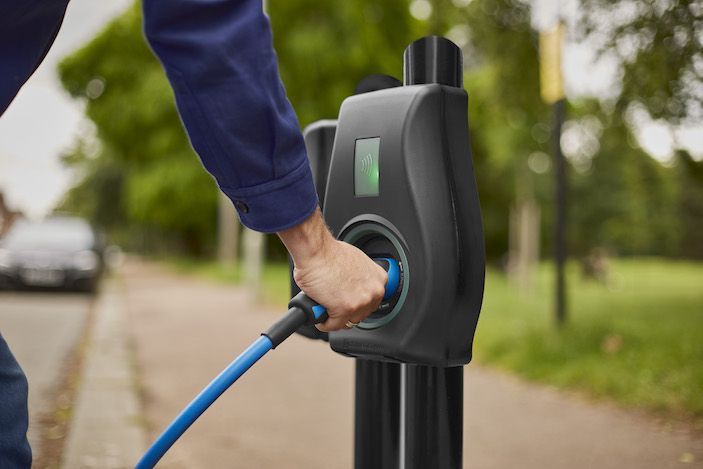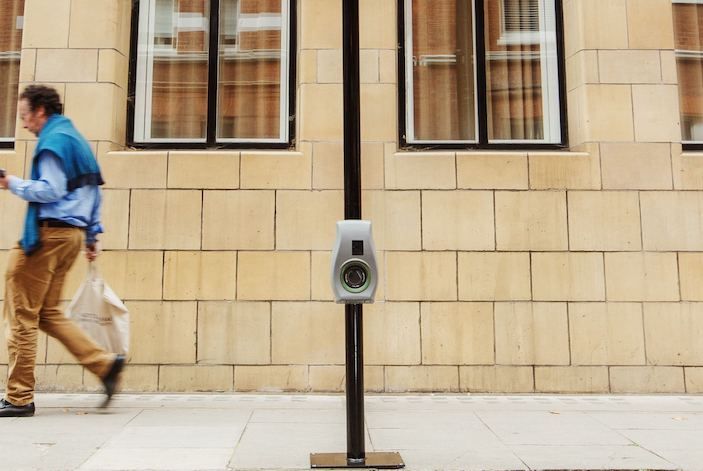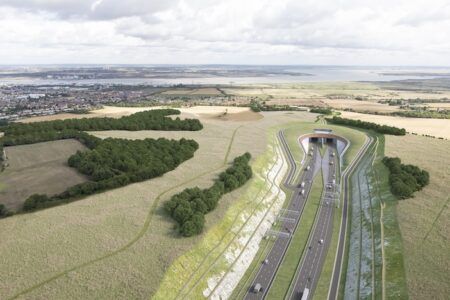Data released from the UK’s first-ever trial of smart metered on-street electric vehicle (EV) chargers – Agile Streets – demonstrates that smart charging at public charge points could save drivers £604.65 (US$712) per year in charging costs, compared to traditional non-smart public charging. This is equivalent to UK-wide collective savings of over £4.1 billion (US$4.9 billion) a year by 2030.
The government-backed project, delivered by a consortium of companies including EV infrastructure specialist Connected Kerb, also shows that peak energy demand – the time of day when energy demand is greatest – would be reduced by as much as 240MW, equivalent to boiling over 1.4m kettles. Achieving the same peak demand reduction by using lithium-ion battery storage would cost around £83 million (US$99 million) plus an annual operating cost of £1.5 million (US$1.8 million). Smart charging also reduces the demand on local grid connection capacity, enabling more chargers to be installed to support the UK Government’s target of installing 300,000 public EV chargers by 2030.
EV ownership is skyrocketing, with UK registrations taking up 40% more compared to this time last year. However, rising energy bills erode the advantage of lower running costs for EVs compared to internal combustion engine (ICE) cars. Currently, an average EV is just 3.9p per mile cheaper to run than a petrol equivalent if charging at home, compared to 9.2p before the energy price cap increase in October. Home smart charging energy tariffs can help keep costs down for EV drivers, making EVs 13.5p cheaper per mile compared to ICE cars even after the October price rise, thus helping to maintain the financial benefits of driving an EV.
62% of UK households do not have access to off-street parking or a dedicated parking space with domestic power supply, meaning they must rely on public charging infrastructure to charge their EVs and therefore do not have access to smart energy tariffs. They also pay 20% VAT compared to the 5% paid on home energy. This creates a significant inequality between road users and people who can charge their vehicle at home. It further impacts the overall cost advantages of going electric, as outlined in a report commissioned by the UK Government.
Smart metering works by enabling EVs to schedule charging to times when energy prices are cheapest, such as overnight when demand is low or on sunny and windy days when there is an abundance of cheap solar and wind energy. This reduces emissions, takes pressure off the grid at peak times and keeps costs low for drivers. By using the Agile Streets app and scheduling the time a car needs to be fully charged, drivers will have enough power to drive away when needed.

The Agile Streets project saw 100 Connected Kerb on-street EV chargers deployed at 17 sites across four UK local authorities – Shropshire, Hackney, Glasgow and East Lothian. Over the course of six months, 2,451 charging sessions took place, totalling 51,618 kWh of energy. These charging sessions were completed by 368 trial participants.
Drivers had the option of a smart charging ‘Eco’ mode at 19p/kWh, which would schedule charging at the lowest-cost times of day – or a ‘boost’ mode at 33p/kWh, which would immediately deliver power like a normal non-smart public charger. Charging an average 62kW Nissan Leaf from 20% to 100% using ECO mode saves drivers £6.95 (US$8.25) per session – equivalent to a 42% saving.

The chargers used in the Agile Streets project will be handed to the local authorities in each participating region. Connected Kerb plans to continue working on smart charging, with a view to adopting smart charging technology across as much of its network as possible.
The Agile Streets project is delivered by a consortium comprised of Connected Kerb, Samsung Research, Octopus Energy for Business, SMETS Design Limited, Energy Saving Trust and the Power Networks Distribution Centre. The project was awarded £1.5 million (US£1.8 million) by the Department for Business, Energy and Industrial Strategy (BEIS) to deliver the Beyond Off-Street Smart Meter Electric Vehicle Charging programme.





